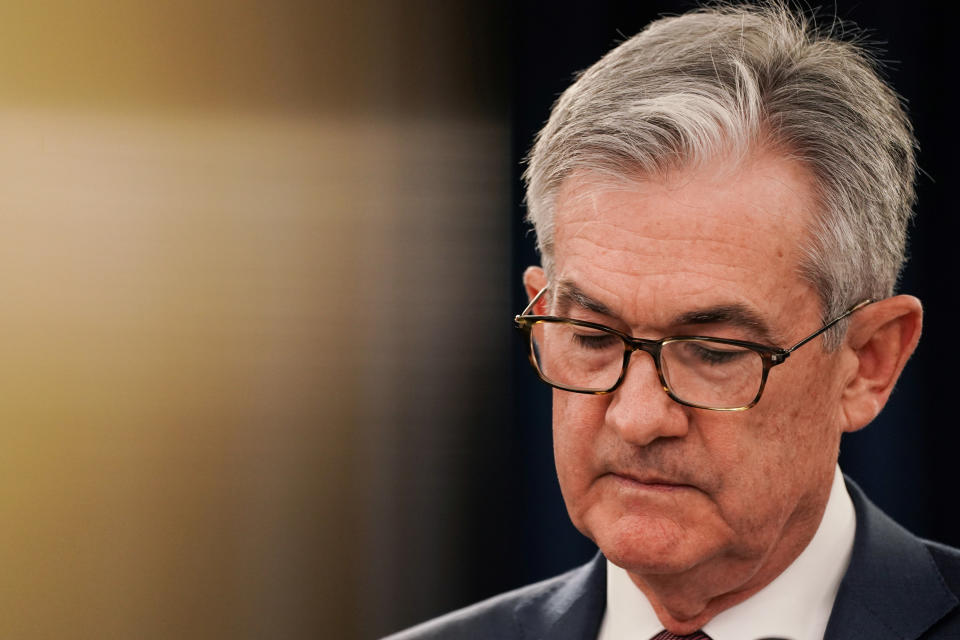Fed Chair Powell: Negative interest rates 'would certainly not be appropriate'
Federal Reserve Chairman Jerome Powell told Congress Wednesday that the central bank is not considering negative interest rates in the United States, one day after President Donald Trump bashed the central bank for not having lower interest rates.
In his first public remarks since the Fed’s last cut on Oct. 30, Powell told the Joint Economic Committee that negative interest rates “would certainly not be appropriate in the current environment.”
On Tuesday, Trump said he would like the Fed to push interest rates into negative territory, arguing that the U.S. is at a “competitive disadvantage” for having higher interest rates than other countries. Trump estimated that stocks would be 25% higher if the Fed had not raised interest rates during the beginning of his presidency.

“Give me some of that, give me some of that money, I want some of that money,” Trump told the Economic Club of New York. “Our Federal Reserve doesn’t let us do it.”
Powell, who Trump tapped to be Fed chairman in early 2018, reiterated to Congress that the Fed is not swayed by commentary from the president.
“Politics plays absolutely no role in our decisions,” Powell told the Joint Economic Committee. “We use the best data, the best analysis we can muster. We are human, we’ll make mistakes, but we won’t make mistakes of character or integrity.”
Powell added that negative interest rates in the U.S. "would certainly not be appropriate in the current environment."
Rate pause?
On the current path of monetary policy, Powell said that after cutting interest rates three times this year, he feels the central bank’s policies are “likely to remain appropriate” for the time being.
Powell said that his economic outlook “remains favorable” but continued to express concern over trade developments and “sluggish” growth abroad.
The Fed chairman said that while he is comfortable with interest rates currently in the range of between 1.50% and 1.75%, he insisted that policymakers will continue to watch incoming data for any possible changes in the economic outlook.
“Of course, if developments emerge that cause a material reassessment of our outlook, we would respond accordingly,” Powell said in prepared testimony. “Policy is not on a preset course.”
Fed policymakers have felt more comfortable easing policy because of the absence of inflationary pressures. With unemployment near 50-year lows, a tightening labor market has not led to a jump in inflation that would otherwise push the central bank to hike rates again.
The most recent jobs report for October showed the U.S. economy adding 128,000 jobs with the unemployment rate holding at 3.6%. Inflation readings have remained below the Fed’s 2% target. On Wednesday morning, the Bureau of Labor Statistics reported a core consumer price index reading of 2.3% in October, but core CPI tends to overstate the Fed’s preferred reading of core personal consumption expenditures. And the 2.3% reading suggests cooling inflation because readings in August and September were both higher.
“The current level of unemployment is consistent with a strong labor market but it is not one in anyway that is presenting difficulties,” Powell told Congress.
Powell said he is watching a few medium- to longer-term risks as well, such as the “unsustainable path” of federal debt. Powell said lower interest rates do not mean the U.S. will pay less in interest, adding that “it does not mean that we can ignore deficits.”
Powell also made it a point to emphasize that the Fed’s mid-October decision to resume balance sheet growth is not quantitative easing, saying that its decision to target short-term Treasury bills is not the same as buying the large-scale asset purchases it made to battle the financial crisis.
The Fed chairman will return to Capitol Hill on Thursday morning to testify to the House Budget Committee.
Brian Cheung is a reporter covering the banking industry and the intersection of finance and policy for Yahoo Finance. You can follow him on Twitter @bcheungz.
Nobel Prize winner: Reducing poverty can rebuild 'trust' in economics
Trump: Stocks would be 25% higher if the Fed had not raised rates
Federal Reserve officials say they 'can't afford to ignore' climate change
‘The weirdest place in the world’: What the Fed missed in Jackson Hole
Read the latest financial and business news from Yahoo Finance
Follow Yahoo Finance on Twitter, Facebook, Instagram, Flipboard, SmartNews, LinkedIn, YouTube, and reddit.

 Yahoo Finance
Yahoo Finance 
